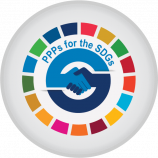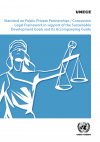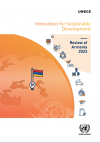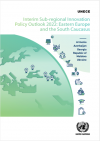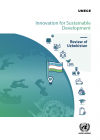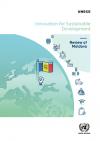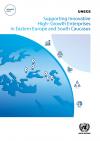Economic Cooperation and Integration
Introduction
The Economic Cooperation and Integration sub-programme 4, implemented by Economic Cooperation and Trade Division, supports UNECE member States in designing and rolling out institutions, policies, processes and initiatives with a strong role for good governance to build innovative, competitive, and inclusive societies to progress towards the goals set out in Agenda 2030 in the areas of innovation policy and public-private partnerships (PPP).
The sub-programme serves regular meetings of intergovernmental bodies, offering platforms for international policy dialogue and exchange of best practices and lessons learned in the UNECE region: the Committee on Innovation, Competitiveness and Public-Private Partnerships; the Working Party on Public-Private Partnerships; and the Team of Specialists on Innovation and Competitiveness Policies.
ECI also contributes to substantive work under the UN Special Programme for the Economies of Central Asia (SPECA). The SPECA Working Group on Innovation and Technology for Sustainable Development (WG on ITSD) brings together senior policymakers and experts to develop guidance and practical solutions to problems identified by the SPECA countries and promotes sub-regional cooperation on innovation for sustainable development. In 2019, the SPECA Governing Council formally adopted the SPECA Innovation Strategy for Sustainable Development, serving to guide and co-ordinate regional co-operation in several areas.
In the area of innovation policy, UNECE supports member States through normative work, such as policy dialogue and policy principles; analytical work, such as national Innovation for Sustainable Development Reviews, the sub-regional Innovation Policy Outlook, and thematic publications; and capacity building, such as regional and national trainings to help countries put recommendations into practice as well as a series of policy handbooks.
In the area of PPPs, UNECE’s objective is to increase the expertise of governments to identify, negotiate, manage, and implement successful PPPs projects. This is done through exchange of knowledge and experiences of PPPs by member States, including experts from public and private sectors, particularly in the identification and testing of best practice. The activities will result in standards, guides on best practice, studies and innovative tools that can be used in capacity-building programmes and training.
Key areas of work
In focus
Highlights
- Second Session of the SPECA Working Group on Innovation and Technology for Sustainable Development and Sub-regional SPECA workshop on Innovation for Sustainable Development held on 20 October in Bishkek, Kyrgyzstan
- The 13th session of UNECE Team of Specialists on Innovation and Competitiveness held on 1-2 November in Geneva, Switzerland
Upcoming Events
EIT (European Institute of Innovation and Technology)
Brussels
Belgium
Palais des Nations, Room VII.
1211 Geneva,
Switzerland
Recent Events
Room V, Palais des Nations
Geneva
Switzerland
Conrad Istanbul Bosphorus
Istanbul/
Türkiye


